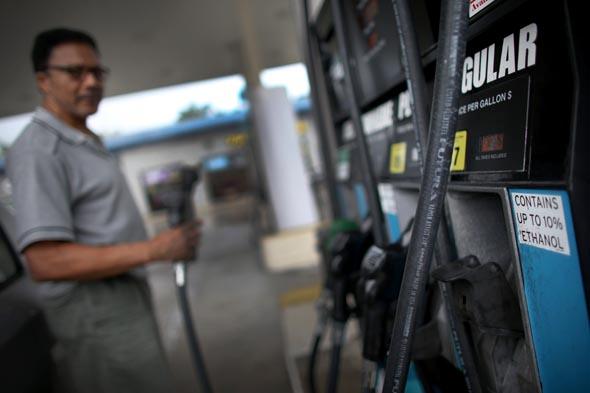“These misguided rules could cost jobs,” thundered Sen. Charles Grassley, Republican of Iowa, last Saturday, in response to a new Environmental Protection Agency proposal. Another case of conservatives fighting against environmental standards? No: Grassley continued that the rules would “create dirtier air, while protecting the stranglehold Big Oil has on the country’s fuel supply.” So was this a case of all-too-rare bipartisanship in today’s polarized D.C? A Republican finally standing up for science and environmental protection?
Well, no, it’s not that either. The politics are bipartisan, but Grassley’s stand was neither for free markets nor clean air. It’s just the latest twist in the ongoing saga of corn politics. The EPA, you see, issued a proposal last Friday to reduce the amount of ethanol that regulations require to be put into America’s gasoline. Ethanol can, in principle, be made from many things. But in practice in the U.S., it’s made from corn. And if there’s one form of big government that America’s farm-state Republicans love, it’s the kind of big government that subsidizes corn production and the owners of corn farms.
Not that Grassley stands alone by any means. “The administration should be working every day to create jobs and strengthen the economy,” observed Bruce Braley, a House Democrat from Iowa, “yet the EPA’s proposed rule does just the opposite.”
In fact, no. The EPA’s proposed rule will be good for the American economy, good for the global economy, and a win for the government all at once. Bad as it is for the environment to burn oil to fuel vehicles, growing corn (which requires fertilizer, tractors, etc.) to turn into ethanol and then burning the ethanol is even worse. EPA analysis has shown that the life-cycle CO2 emissions associated with corn ethanol are higher than those from gasoline, and you get bonus environmental destruction in the form of open land being converted to agricultural use.
Not that environmental concerns are exactly what drove the EPA to act. It’s a small irony that Big Oil and the automobile industry are the ones whose lobbying clout is driving a piece of sound environmental policy.
The way the 2007 Renewable Fuel Standard program works is that the nation’s oil refineries are supposed to steadily ramp up the amount of ethanol they blend into the nation’s gasoline supply. What the law’s authors didn’t anticipate is that 2007 would also prove to be the start of a secular decline in driving. At the same time that Americans started driving fewer miles, our cars were becoming more fuel-efficient. That means the amount of ethanol per gallon of actual fuel has had to increase much more rapidly than anticipated, bumping up against the “blend wall” of 10 percent ethanol. The oil and corn industries have a long-running dispute as to whether it’s actually true that adding more ethanol than this is unsafe, but as Ben Adler explains, “car companies say their warranties won’t cover cars that use gasoline with 15 percent ethanol”—so as a practical matter, the wall is real enough.
The EPA’s idea is to put 15.2 billion gallons of ethanol in gasoline in 2014 rather than the 16.55 billion used this year.
Using less ethanol would be a small win for the environment and a huge win for the economy. Even as mainstream America has wrestled with high unemployment and massive excess capacity, the farm economy has been booming. Rising prosperity in Asia has increased demand for meat, and each extra pound of meat eaten requires several pounds of grain as feed. That’s left slower-growing parts of the world—from North Africa to North America—facing higher food prices, stifling demand for other goods and services. Addressing this problem by hoping China stays poor would be perverse. But exacerbating the problem by pouring huge quantities of corn into our gas tanks is insane. In effect, everyone on the planet who eats food is being taxed to subsidize a relatively small number of richer-than-average farmers. Reduced ethanol use will reduce farm incomes (hence the squeals from the Iowa congressional delegation), but the money will flow straight into the pockets of food consumers. That will leave households with more money to spend on job-creating purchases of other things, creating large net economic benefits.
Meanwhile, the circumstances of the ethanol crisis are a powerful reminder that the problem of oil dependence has an obvious solution: burn less gasoline. That doesn’t play as well in the Iowa caucuses as schemes to power cars with corn, but it makes a lot more sense. With higher gasoline taxes and fuel economy standards, somewhat fewer people will drive, and those who do will drive somewhat fewer miles in somewhat lighter cars with somewhat more advanced engines. Trends are already in that direction without much in the way of supportive federal policy, and anyone genuinely interested in cleaner air can push to go further down that road. In the absence of anything that sensible, getting the corn out of our gas tanks will have to suffice.
